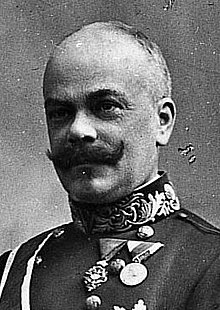Ernest von Koerber
| Ernest von Koerber | |
|---|---|
 |
|
| 18th Minister-President of Cisleithania | |
|
In office 19 January 1900 – 31 December 1904 |
|
| Monarch | Franz Joseph I of Austria |
| Preceded by | Heinrich Ritter von Wittek |
| Succeeded by | Paul Gautsch Freiherr von Frankenthurn |
| 25th Minister-President of Cisleithania | |
|
In office 29 October 1916 – 20 December 1916 |
|
| Monarch |
Franz Joseph I of Austria Karl I of Austria |
| Preceded by | Count Karl von Stürgkh |
| Succeeded by | Heinrich Graf von Clam-Martinic |
| Personal details | |
| Born |
6 November 1850 Trento, Tyrol, Austrian Empire |
| Died | 5 March 1919 (aged 68) Baden bei Wien, Lower Austria, Austria |
| Religion | Roman Catholic Church |
Ernest Karl Franz Joseph Thomas Friedrich von Koerber (6 November 1850 – 5 March 1919) was an Austrian liberal politician and statesman who served as Minister-President of Cisleithania from 1900 to 1904 and again in 1916.
Ernest von Koerber was born in Trento, Tyrol, Austrian Empire, in a German speaking family, the son of a Gendarmerie officer. Koerber attended the elite Theresianum boarding school in Vienna and, having obtained his Matura degree, went on to study law at the University of Vienna. He became extremely involved in Austrian culture and politics. The study of the Rechtsstaat ("legal state") doctrine, or constitutionality and civil rights was popular during Koerber's teen years and Koerber and his constitutionally-minded peers such as Sieghart, Steinbach, Baernreither, and Redlich learned and immersed themselves in this principle.
Koerber’s knowledge of government was apparent when in 1874 he launched his career in the civil service, entering the Austrian Ministry of Commerce. In 1895 he was appointed general manager of the Imperial Royal Austrian State Railways and obtained the honorific title of a Geheimrat the following year. By 1897 Koerber was a member of the Imperial Council parliament of Cisleithania (i.e. the 'Austrian' portion of Austria-Hungary) and Commerce Minister. At this time, after the Austro-Hungarian Compromise of 1867, there were separate internal governments for the Austrian lands and the Kingdom of Hungary. Two years later in 1899, Koerber rose to the position of Austrian Minister of the Interior. In 1900, Emperor Franz Joseph asked Koerber to create a cabinet and serve as Prime Minister. This was by far the most influential position of Koerber’s career. Koerber served in this capacity until the end of 1904.
...
Wikipedia
